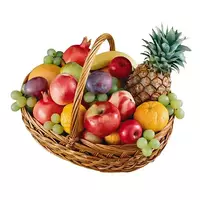Fruit

Fruit is the collective name for the edible fruits of various plants, usually growing in a tree or shrub. The fruit got its original name thanks to the Latin word fructus, which literally means "fruit. " Often, some berries are classified as certain types of fruits. It is worth noting that fruits are more of a household or folk name for the fruits of edible plants. In addition to fruits, vegetables are also distinguished - these are edible components of various types of herbaceous plants, as well as nuts and cereals.
Fruit composition
Currently, botanists have discovered, described and studied a large number of various types of fruits. It differs not only in appearance, distribution area, as well as in taste or other consumer characteristics of fruits, as well as in the vitamin and mineral composition of fruits. Often, the chemical composition of fruits contains unique natural compounds that are considered indispensable for the human body. For example, citrus fruits are famous for their high content of vitamin C in their composition. The calorie content of fruits also depends on the compounds included in the fruit.
However, in the vast majority of cases, the calorie content of fruits is at a fairly low level, which allows the use of various types of fruits as dietary foods. All fruits can be classified depending on the genus to which a particular plant belongs. The following largest groups of fruits are distinguished:
seed fruits (apples, pear, hawthorn);
stone (apricot, cherry, cherry plum);
berries (strawberries, raspberries, cloudberries);
fruits from the Pumpkin family (watermelon, melon);
citrus fruits (orange, lemon, grapefruit).
In addition, Australian, Mediterranean, tropical and subtropical fruits are distinguished. It is worth noting that in nature there is another huge layer of fruits that are not used in cooking, since the fruits of these plants are not suitable for consumption. The distinctive properties of the fruit of humanity are used from the earliest period of its development and existence. Since people have been collecting for a long time, fruits have become an integral part of the human diet.
Fruit benefits
Over time, people began to actively use the beneficial properties of fruits. The exceptional benefits of fruits lie primarily in the vitamin-mineral composition of fruits. As mentioned above, each type of fruit differs in the content in its chemical composition of certain useful and even indispensable compounds of natural origin for the human body. The chemical composition determines the beneficial properties of fruits.
It is safe to say that regular consumption of fruits, of course in moderation, is not capable of harming human health. The unique benefit of fruits is that fruit fruits or berries can be eaten without heat treatment, during which most of the beneficial compounds contained in the products are destroyed.
Fruit harms
However, in addition to benefits, there is also harm to fruits. For example, frequent consumption of certain types of fruits can provoke the occurrence and development of severe diseases. True, in fairness, it should be noted that there will be no harm from fruits if you use fruit fruits correctly in moderation. for example, if you eat an apricot on a hungry stomach, the fruit can cause indigestion and discomfort. At the same time, an apricot eaten 15 minutes after eating will help improve the digestive process.
fruit 36 kCal
Energy value of fruits (Ratio of proteins, fats, carbohydrates - ju):
Proteins: 0.92 g (~ 4 kCal)
Fats: 0.2 g (~ 2 kCal)
Carbohydrates: 8.1 g (~ 32 kCal)
Energy ratio (bj | y): 10% | 5% | 90%
 Español
Español Français
Français Português
Português Русский
Русский 简体中文
简体中文 繁體中文
繁體中文 日本語
日本語 한국어
한국어 العربية
العربية Türkçe
Türkçe Қазақ
Қазақ Deutsch
Deutsch Italiano
Italiano Українська
Українська
